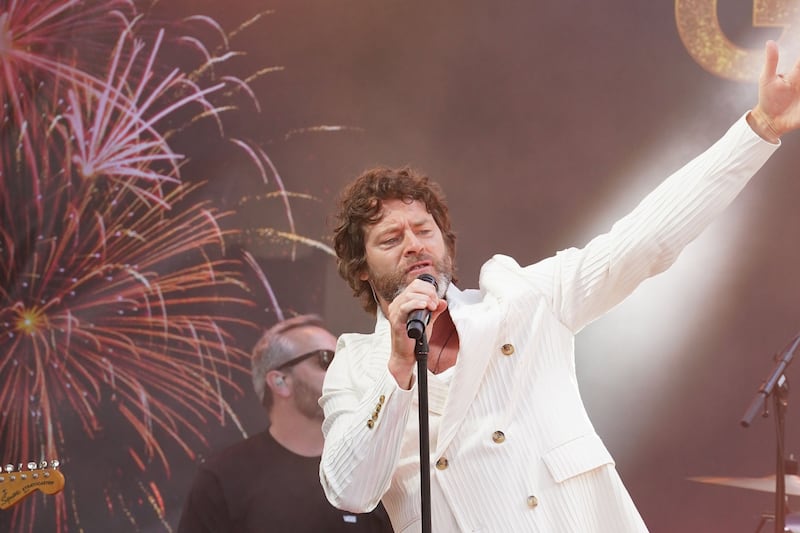TAKE That's original fans aren't screaming schoolgirls any more, but decades later, their adoration for the band is no less fervent. So if you aren't a devotee, best to pop your earplugs in tomorrow, when the boy band's remaining three members – Gary Barlow, Howard Donald and Mark Owen – will invite television viewers to join them for An Evening With Take That.
As the trio warm up their vocal chords to perform tracks from new album Wonderland, along with the classics, we look back on their – occasionally bumpy – journey.
The origins of the group dates back to the late-80s, when a teenage Gary Barlow, who had been plying his trade performing covers on the north-of-England club circuit, met agent and manager Nigel Martin-Smith. The Manchester-based music manager was looking for a UK act to emulate the success of US boy band New Kids On The Block, and began to build a group around the talented young singer-songwriter.
Completing the band – originally called Kick It – were Mark Owen, Jason Orange, Howard Donald, and a cheeky-grinned 16-year-old called Robbie Williams
Barlow later said of his bandmates: "Robbie had all the cool gear on and Jason had a really natural physique and Howard just looked like a model. They looked like they all looked after themselves; they dressed well, they were all quite fit. I was kind of like, 'I've got to work at this.'"
The boys were put through their paces learning dances and routines to mould them into the perfect pop group. Their outfits were eye-catching, to say the least – think bondage gear, chains and Lycra. Soon, Take That were ready to record their first video, for 1991 single Do What U Like. Once again, they pushed the boundaries, with scenes of them having jelly and whipped cream rubbed over their torsos
It may have failed to set the charts alight, but it did get them noticed; and their second single, Promises, reached the Top 40 (just – at No 38) as Take That's fan base began to grow.
A few more singles followed – including It Only Takes A Minute, a cover of the 1975 Tavares song, which reached No 7. But it was a Barlow-penned love song, Pray, which gave the band their first moment at the top spot.
With success came fan hysteria. Girls would camp outside the boys' houses, graffiti the sides of their tour bus, and sneak into hotels the band were staying in. Barlow has since recalled: "You're asleep at night and someone throws something at the window, there's girls singing Could It Be Magic until three in the morning."
The band weren't always complaining about the female attention, however. "Drugs and sex and the pop and roll, I suppose that's what we were," Owen has joked. "I think we all had our fair share of fun and sex and frolics."
More number ones followed (and 10 million album sales), but behind the scenes, cracks were emerging. Williams was particularly unhappy, and drinking heavily. Tensions came to a head on tour in 1995 and the decision was taken – by both him and his bandmates – that he would leave the group.
Take That completed the tour as a quartet, but just months later, on February 13, 1996 (which, incidentally, was Williams' birthday), they held a press conference to announce they were splitting up. Fans were left reeling by the announcement, and a helpline was set up by The Samaritans.
Williams and Barlow soon embarked on solo projects, and headlines focused on the rivalry between the pair. Williams's career soared after the release of 1997 ballad Angels, a global hit that has been played at weddings and funerals ever since. Barlow's solo bid failed to take off in the same way, however, and he was eventually dropped by his record label, RCA.
In 2005, a decade after their split, Take That announced they were reforming – minus Robbie Williams. Each received a reported £1.5 million for their involvement in The Ultimate Tour. Five years later, and 15 years since his acrimonious exit, Williams rejoined the band, with an album of new material, called Progress, and live dates.
Williams said at the time: "I get embarrassingly excited when the five of us are in a room. It feels like coming home."
Barlow, meanwhile, has said he was "probably the most desperate out of everyone" to get Williams back in the band, explaining: "I just thought it gave our story a nice end."
Over the years, fans have seen Williams come and go from the line-up, describing himself as a "floating member". In 2014 Orange announced he was leaving, insisting at the time: "There have been no fallings-out, only a decision on my part that I no longer wish to do this."
Take That currently performs as a three-piece act of Barlow, Owen and Donald, and their last album, III, reached the top spot. The trio recently appeared on a special edition of Carpool Karaoke for Comic Relief in Los Angeles with superfan James Corden, revealing during their spin why plans for the group to crack the US never materialised.
They recalled how record company executives flew in to discuss their big plans with the group, but at the end of their presentation, Donald simply responded: "I can't be a***d."
Meanwhile, Barlow says the buzz of performing still hasn't wavered after all these years.
"It's two hours where I put my ears in and it's just me, my brothers and the audience, and it's brilliant. I almost don't want to come off, because I know I'm going back to that real world."
:: An Evening With Take That airs on ITV on Saturday, April 8; Take That perform at Dublin's 3Arena on May 15 and 16 (ticketmaster.ie).








